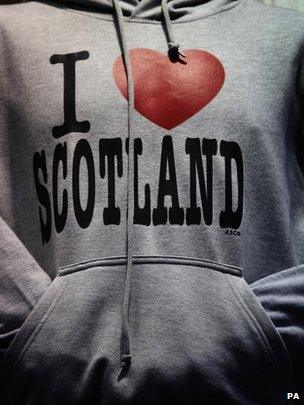Scottish independence: Electoral Commission concern over poll
- Published

The Electoral Commission said it must clarify its thinking on lowering the voting age for teenagers
The elections watchdog has warned the Scottish government must clarify its plan on letting 16 and 17-year-olds vote in the independence referendum.
Current rules mean the vast majority of 16-year-olds would not be able to vote in the poll, the Electoral Commission said.
The body also warned there was a risk over the SNP government's wish to hold the referendum in autumn 2014.
The Scottish and UK governments welcomed the commission's comments.
The UK government is currently in talks with Scottish ministers on devolving powers which it says are needed to make the referendum legally watertight, as constitutional issues fall under the responsibility of Westminster.
The SNP wants to lower the voting age in the referendum, in keeping with long-standing policy, but opposition parties oppose the move.
Responding to the two separate consultations on the referendum, externalissued by the Scottish and UK governments, the Electoral Commission pointed out that 16-year-olds may only currently be included on the register if they become 17 on or before 30 November that year.
This is because they will subsequently become 18 on or before 30 November of the following year - the period to which the register applies.
The commission said it understood all 17-year-olds would be eligible to apply on a canvass form to have their names included in the electoral register, and would therefore be able to vote at the referendum.
But it warned: "Under existing UK legislation, however, the majority of 16-year-olds are not entitled to apply to have their names included in the electoral register.
"It appears that these people would therefore not be able to vote at the referendum."
The commission's report stated: "If the Scottish government wishes to allow 16 and 17-year-olds to vote at the Scottish referendum, it will need to set out specifically how it will ensure that all 16 year-olds are eligible to apply to have their names included in the electoral register and therefore able to vote at the referendum.
"If this would require amendments to current UK legislation, the Scottish government should set out how it intends to work with the UK government to develop and introduce legislation to the UK Parliament to make such amendments."
In its wide-ranging report, the commission also said an autumn poll needed to take into account the relatively short number of daylight hours at that time of year.
It also warned that changes in the way people need to register to vote, coming into force in July 2014, "could lead to potential confusion for electors, as well as posing practical challenges for electoral registration officers in Scotland to ensure that the registers used both for voting and campaigning at the referendum are complete and accurate".
And on suggestions that voting on the referendum could be held on a Saturday, the commission said thought had to be given to people who could not go to the polling booth for religious reasons or those needing access to a carer, had childcare issues or lived rural areas where public transport was not so readily available at weekends.
But the body also said Saturday voting would mean schools, which are often used as polling stations, not having to close.
The Electoral Commission insisted the voters must come first, and said it wanted to work with the Scottish and UK governments to ensure that the referendum was well-run.
John McCormick, electoral commissioner for Scotland, said: "The people of Scotland face a historic decision and the referendum must take place in a way that is transparent, open to scrutiny, gives voters confidence and delivers a result accepted by all.
"We have made a number of recommendations about how both governments' proposals may be strengthened to achieve this.
"We will continue to provide advice and scrutiny to both governments as they take this work forward."
The precise role of the independent Electoral Commission in the referendum has yet to be defined - the Scottish government previously wanted to bypass it and set up a new Scottish electoral body to oversee the running of the referendum.
The Scottish government said the report showed its 2014 timetable was a sensible one, rather than the wish of UK ministers to hold it sooner, rather than later.
A spokesman added: "The commission's detailed response covers the range of issues set out in the government's consultation, and we will consider carefully the points made as we develop our proposals to ensure that the referendum on independence meets the highest international standards of fairness and transparency."
However, the Scotland Office said the commission report had shown its proposed date of September 2013 was a good time to stage the poll.
"The commission points out that 2014 may be a time of significant change for electoral registration, and that holding the referendum that year 'could lead to potential confusion for electors as well as posing practical challenges for Electoral Registration Officers in Scotland'," said a Scotland Office spokesman.